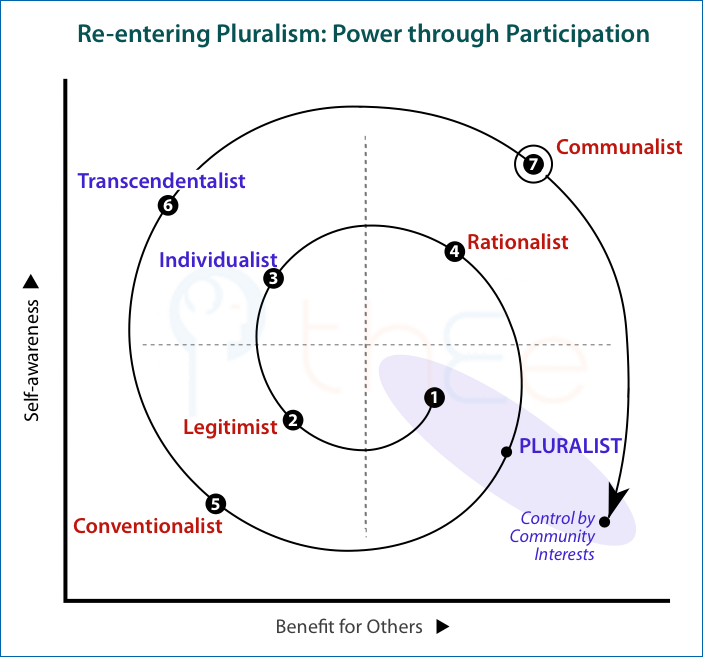Review of Cycle-2 of the Spiral
The Matrix of Features
In reading this matrix, recognize that the features becomes possible because of the maturation generated in the Cycle-2 . The maturational process is cumulative so even the earliest features do not disappear entirely or (in some cases) at all.
| Categories | Plutocratic Pluralist-II |
Conventionalist | Transcend'alist | Communalist | Participative Pluralist-III |
|---|---|---|---|---|---|
| Source of Power |
Money and its control |
|
Strengths of the people |
||
| Commonality Fundamentals | |||||
| Integrating Force | Sectional ideals |
Expressed public consensus |
Personal convictions |
Communities for each & all |
Socially useful ideals |
| Socio-Political Institution | Interest-based groups |
Self-mobilization of civil society |
Genuine civic commitment |
Needs-based policy-making | Communities of choice |
| Governance Requirement |
Group representatives |
Norms of professionalism |
Application of ultimate values | Localism & subsidiarity |
Community leaders |
| Individuality Fundamentals | |||||
| Personal Benefit |
Lobbying & group pressure |
Better relations of the government and the people. |
Self-acceptance | Being valued by the community |
Criterion of reasoned fairness |
| Social Interactions |
Targeted monitoring |
Discussions in diverse networks |
Empathy & compassion |
Effective use of diversity |
Interpersonal & social pressure |
| Provision of Knowledge |
Crusades & campaigns |
Multiplicity of perspectives | Accounts of psychosocial potentials |
Freedom of information |
Easy accessibility via multiple sources |
| Personal-Ethical Requirements | |||||
| Core Value | Fraternity | Equality | Harmony | Peace | Fraternity |
| Civic Virtue | Prudence | Moderation | Integrity | Benevolence | Prudence |
The Three Transitions

The transitions and mode principles defined for Cycle-2 are somewhat theoretical because no society has yet matured in this way, Despite the errors, the narrative has been offered as possible, relevant and moving in the right direction. This form of imaginative work may assist a desired future to emerge.
 Plutocratic pluralism ► Conventionalist ethos
Plutocratic pluralism ► Conventionalist ethos
 Conventionalist ethos ► Transcendentalist ethos
Conventionalist ethos ► Transcendentalist ethos
 Transcendentalist Ethos ► Communalist Ethos
Transcendentalist Ethos ► Communalist Ethos
- Now it is possible to review the whole trajectory of political maturation.
Originally posted: July 2009; Last updated: 27 Jan 2010
All posted material is part of a scientific project and should be regarded as provisional. Visitors are encouraged to think through the topics and propositions for themselves. Copyright © Warren Kinston 2009-2016.
All Rights Reserved.
comments powered by Disqus